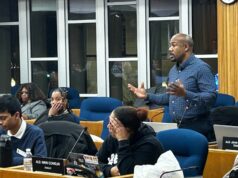There’s been a lot of talk and movement on inclusion in the workplace over the last few years, but how successful can those efforts be if they’re not purposeful and intentional?
That was the topic at the Women’s Leadership Summit on June 30 in a panel discussion moderated by Wisconsin Foundation and Alumni Association Director of Diverse Alumni Engagement Gia Gallimore. On the panel were Maydm CEO and technology educator Dr. Christina Outlay; Madison College VP of Equity and Inclusion Dr. Damira Grady; Madison Alder and Empathy 4 Equity founder Nasra Wehelie; and Park Bank Talent Management Officer Kayla Conklin.
Conklin said being purposeful in inclusion efforts begins with understanding an employer’s current situation.
“It’s important to survey your current environment and understand where you’re at, at this moment right now. Because if you don’t understand where you’re at, in your journey, right now, how can you determine where you want to be?” she said. “And then after that, building the infrastructure to support these diverse candidates that you’re looking to bring in, because they do need resources and support immediately when they start at your company. I always say that you’re setting people up to fail if you are just hiring with the idea that we will just bring diversity by hiring black people or brown people or somebody with a marginalized identity. Because what they need when they get there is a lot of things they need policies and procedures to support them, they need safe spaces, they need representation and leadership so they can see a pathway to growth.”
Wehelie said some diversity efforts fail because they’re not
“What’s missing is empathy,” she said. “So organizations have spent billions of dollars in diversity training yet failed to realize much return on their investment. Too often people think it’s just like one fit, one size fits all. We have learned over the last 40 years, it takes more than training to have an inclusive workforce environment. Diversity, equity and inclusion are not a hypothetical concept that organizations can pay lip service to.”
Grady echoed that sentiment, arguing that employers need to understand the reasons behind the efforts
“I ask people, what is your why? It’s joyful for me to see everybody showing up in the space and wanting things to be different,” she said. “But then it’s also scary for me because I see a lot of violent things happening, this voyeurism happening around this work, and people not really understanding their why.”
Outlay added that bringing in diverse talent is one thing; keeping those folks is another.
“I think we often think about diversity and building a diverse team, and looking around our team in our environment, we look at, who are we missing? How can we diversify the team? But we don’t think about, first, why would someone want to join this culture that we currently have? Do we have a culture that’s going to support a diverse team?” she said.
The Women’s Leadership Summit continues at noon today on Facebook Live.

































